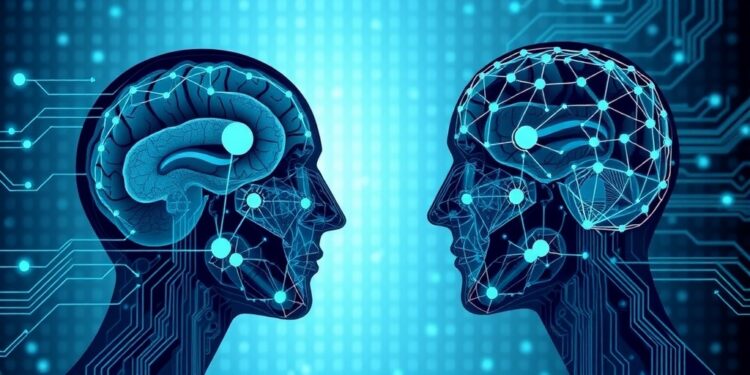
In a groundbreaking study published in JAMA Psychiatry, researchers have made significant strides toward predicting diagnostic transitions to mental health conditions such as schizophrenia and bipolar disorder using routine clinical data from electronic health records. This development is particularly noteworthy as it paves the way for improved patient management and targeted interventions in psychiatric care. The research findings indicate that while schizophrenia can be predicted with remarkable accuracy, the same level of certainty does not apply to bipolar disorder. This differentiation opens pathways for tailored approaches to monitoring patients based on their unique clinical profiles.
The use of electronic health records (EHR) has become increasingly prominent in various fields of medicine, providing a treasure trove of data that can be utilized for predictive analytics. In the context of psychiatric disorders, the inherent complexities of mental health assessments traditionally relied heavily on subjective evaluations, which can be influenced by numerous factors, including clinician biases and patient self-reporting discrepancies. However, by integrating data-driven methodologies, the potential for more objective and quantifiable assessments is burgeoning.
The basis of this study involved the extraction of a vast array of clinical data, including patient history, treatment responses, and demographic information. Advanced algorithms, specifically in the realm of machine learning, were employed to meticulously analyze this data set. These algorithms processed intricate patterns and associations within the data that could serve as early indicators for the onset of schizophrenia or bipolar disorder. The result is a predictive model capable of assessing risk factors and alerting healthcare providers to potential diagnostic transitions.
Moreover, the researchers noted that the factors predictive of schizophrenia were more distinct and consistently identifiable compared to those related to bipolar disorder. This finding may relate to the more pronounced symptoms and progressions associated with schizophrenia, making the illness more detectable through clinical data points. The variability and episodic nature of bipolar disorder could contribute to the challenges in its prediction, highlighting the need for more specialized research in this area.
The implications of this study are extensive. Clinicians could leverage these predictive insights to enhance early intervention strategies, which are crucial in the management of mental health conditions. Early diagnosis and timely treatment can often mitigate the exacerbation of symptoms and improve long-term outcomes for patients. By training healthcare practitioners to recognize these predictive cues, the landscape of psychiatric care could fundamentally improve, leading to better resource allocation and personalized treatment pathways.
Additionally, this research aligns with a broader trend in healthcare towards the integration of artificial intelligence and data science in clinical practice. The ability to utilize machine learning models not only empowers clinicians but also fosters a culture of evidence-based practice, where decisions are supported by empirical data rather than solely subjective judgments. Such advancements are vital in raising the standard of care, ensuring that patients receive interventions that are not only timely but also tailored to their individual circumstances.
Concerns regarding the ethical implications of using EHR data for predictive purposes naturally arise. The privacy and security of patient information are paramount, and rigorous standards must be maintained to protect sensitive data. Transparency in the research process, including how data is collected and utilized, will be essential in maintaining the trust of patients and providers alike. Additionally, involving stakeholders in the conversation around ethical data use and consent will help navigate these challenges while harnessing the benefits of predictive analytics.
As the field of psychiatry continues to evolve, studies such as this one demonstrate the immense potential of clinical data analysis. The intersection of mental health and technology promises a future where predictive analytics can significantly enhance diagnostic precision and treatment efficacy. Further research will undoubtedly continue to refine these predictive models, potentially expanding their applicability beyond schizophrenia and bipolar disorder to encompass a broader array of mental health issues.
Looking forward, it will be essential for researchers to validate these predictive algorithms across diverse populations and clinical settings to ensure their reliability and generalizability. Collaboration between academia, healthcare institutions, and technology firms will be critical in realizing the full potential of these advancements. As we continue to navigate the complexities of mental health diagnoses, the integration of data science will be pivotal in steering us toward a more accurate and personalized approach to patient care.
The study underscores a promising frontier in the realm of psychiatric care, one that transcends traditional methodologies and embraces a more data-centric paradigm. While there remains much work to be done, the foundations laid by this investigation herald a new age for mental health diagnostics. Researchers, clinicians, and patients alike can look forward to the potential enhancements this technology may bring to the field.
In conclusion, the ability to predict transitions to major psychiatric disorders like schizophrenia and bipolar disorder using routine clinical data is a landmark achievement in mental health research. As these insights are translated into clinical practice, they will undoubtedly enhance the effectiveness of mental health services, allowing for more targeted interventions that can lead to improved patient outcomes. The research signifies not just a stride in scientific discovery but indeed a hopeful outlook on the future of psychiatry.
Subject of Research: Predicting diagnostic transition to schizophrenia and bipolar disorder using electronic health records.
Article Title: Predicting Diagnostic Transition to Schizophrenia and Bipolar Disorder from Routine Clinical Data.
News Publication Date: October 2023.
Web References: [Link not provided].
References: [Link not provided].
Image Credits: [Not specified].
Keywords: schizophrenia, bipolar disorder, electronic health records, predictive analytics, machine learning, psychiatric care, mental health diagnostics.
Tags: algorithms in mental health researchbipolar disorder diagnostic challengesclinical data extraction for diagnosisdata-driven approaches in psychiatryelectronic health records for diagnosticsmachine learning in psychiatryobjective assessments in mental healthpatient management in psychiatric carepersonalized treatment strategies for schizophrenia and bipolar disorderpredictive analytics in mental healthschizophrenia prediction accuracytargeted interventions for mental health





